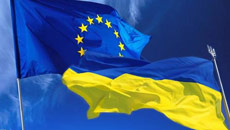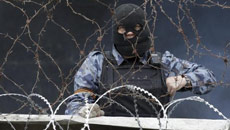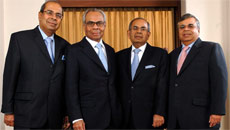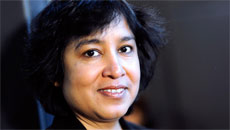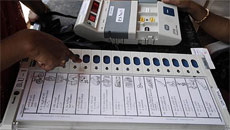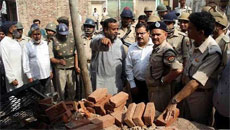After keeping both countries guessing for two days, Pakistan Prime Minister Nawaz Sharif Saturday accepted the invite to watch Narendra Modi take oath as India’s next prime minister, a grand event being attended by seven other neighbours and a few thousand guests. It will be yet another occasion for the leaders of the two wary nations to talk, even though informally, and marks a new phase in neighbourhood diplomacy by India's new head of government.
The two prime ministers will be meeting face to face eight months after the New York meeting between outgoing prime minister Manmohan Singh and Sharif on the sidelines of the UN General Assembly in September.
Sharif Saturday confirmed he will attend the oath-taking ceremony Monday evening, an event to be attended by leaders of six other South Asian nations as well as Mauritius, that has a large ethnic Indian population.
Accompanying Sharif will be Sartaj Aziz, adviser on national security and foreign affairs, Foreign Secretary Aizaz Chaudhry and Special Assistant to the Prime Minister on Foreign Affairs Tariq Fatemi.
Sharif would be holding a bilateral meeting with Prime Minister Modi on the morning of May 27. He would then call on President Pranab Mukherjee, and fly back the same afternoon.
The Pakistani prime minister’s acceptance of the invite came a day after his brother Punjab Chief Minister Shahbaz Sharif met Pakistani army chief General Raheel Sharif. Shahbaz Sharif, who visited India earlier this year and is an important figure in the Pakistani government, is believed to have explained to the general the positive outcome of the visit and the importance of maintaining good ties with India.

On Friday, the Pakistan Foreign Office had urged Sharif to attend the ceremony, saying that the bitterness towards Pakistan shown during the election campaign in India would subside after the formation of a new government in New Delhi.
The acceptance of the invite was lauded, especially on social media. Sharif’s daughter Maryam Nawaz Sharif, who had a day ago tweeted “I personally think cordial relations with new Indian government should be cultivated. It will help remove psychological barriers, fear and misgivings”, welcomed the move with a tweet. So did many other Pakistani journalists and former diplomats. “ Former Pakistani envoy to the US Sherry Rehman posted: “Good news, moving on from stalemate.”
Narendra Modi had invited the leaders of all the member states of the South Asian Association for Regional Cooperation (SAARC) for the swearing-in ceremony - in a first such event.
Modi and Sharif will hold a short bilateral meeting the following morning, being termed only a "courtesy call" and not any structured talks. With Aziz and the two other Pakistani officials in tow, the meeting is likely to have all the trappings of a bilateral meeting.
“It is a good step forward that he (Modi) has taken so early in the term. It is a significant move,” a senior Indian envoy who has been closely following India-Pakistani diplomatic moves, told IANS.

However, the envoy who declined to be named, said that Pakistan had still to show major forward movement in the trial of the 26/11 Mumbai attacks case. “Trial is still going on, it has still to be concluded.. There is also the issue of respect for the sanctity of the Line of Control, and also the issue of non-state actors (acting out of Pakistani territory),” he added.
Jammu and Kashmir Chief Minister Omar Abdullah and Kashmiri opposition leader, Peoples Democratic Party chief Mehbooba Mufti, have welcomed Sharif’s decision to attend the oath taking ceremony.
"Very glad to hear Pakistan's prime minister has accepted the invite, it shows that he can prevail over forces inimical to good relations with India," Omar tweeted.
"I hope that this will mark a new beginning in ties between the two countries. The people of Jammu and Kashmir will be watching it closely," he wrote on Twitter.
Leader of Opposition Mehbooba Mufti told reporters: "The SAARC (South Asian Association for Regional Cooperation) relations have always been hostaged by India-Pakistan acrimony."
"We are hopeful as the decision to invite Pakistan prime minister by Modi and its acceptance by Sharif is a positive development," said the Peoples Democratic Party (PDP) chief.
Besides Sharif, the dignitaries who will attend include Afghanistan President Hamid Karzai, Maldives President Abdulla Yameen, Sri Lanka President Mahinda Rajapaksa, Bhutan Prime Minister Tshering Tobgay, Nepal Prime Minister Sushil Koirala, and Bangladesh Parliament Speaker Shirin Sharmin Chaudhury. Mauritius Prime Minister Navinchandra Ramgoolam is also attending the ceremony.

After outgoing prime minister Manmohan Singh skipped the Commonwealth summit in Colombo last November, this will be an occasion for Modi to meet Rajapaksa and come to grips with the Tamil issue. The invite to the Sri Lankan leader has already been criticised by Tamil parties, including Tamil Nadu Chief Minister J Jayalalithaa.
Bangladesh Prime Minister Sheikh Hasina will be in Tokyo on a prior scheduled visit.
It is the first time in India's history that leaders from neighbouring countries have been invited to the swearing-in ceremony of an Indian prime minister.
Modi, who will be sworn in at the forecourt of the Rashtrapati Bhavan Monday evening, will hold brief bilateral talks with each leader the following day.
